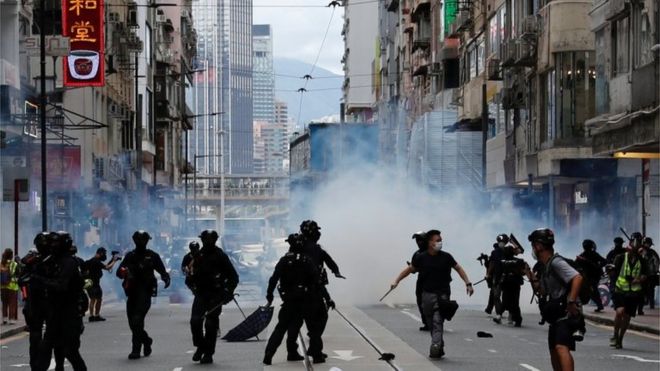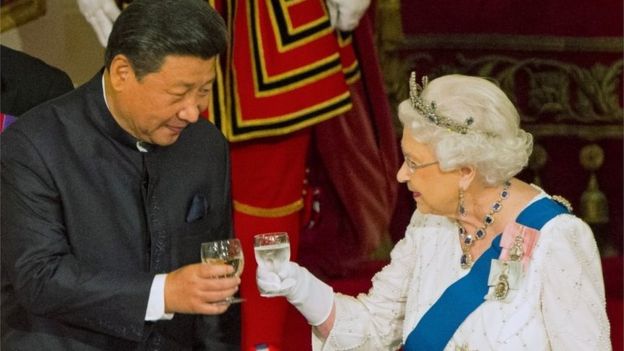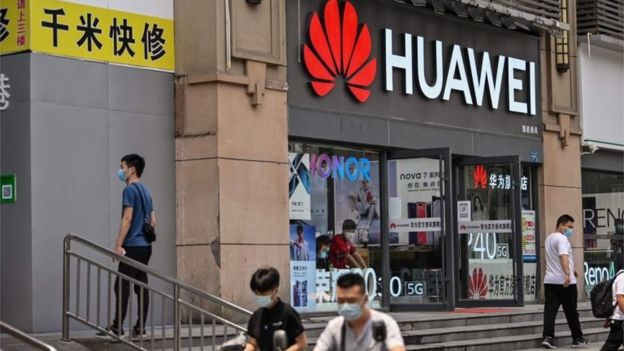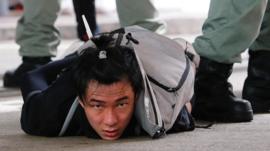 REUTERS
REUTERS
Opening the doors to the UK to as many as around 3 million people from Hong Kong is a big step.
No one in Westminster tonight would expect anything like that number will move here, to escape the increasingly fraught reality of life in Hong Kong. But the decision is important, and not just for those to whom the UK may now provide sanctuary.
It reflects immediate concern in the government about what has been happening on the streets in that packed, throbbing territory.
But the decision was also fuelled by the legacy of British control there. This kind of citizenship was not offered, despite some calls to do so, at the time when Hong Kong was handed back to China in 1997.
Remember that handover took place on the basis that its partial democracy and market economy would be respected. But that's been eroded so visibly in recent years.
- UK makes citizenship offer to Hong Kong residents
- China's new law: Why is Hong Kong worried?
- Political battle looming over UK China relations
It was notable not one MP in the House of Commons spoke against the next phase of Britain and Hong Kong's story being to offer a home to islanders here. Government's decisions are still affected by choices made decades ago.
The decision also reflects a souring of the atmosphere around relations between the UK and China.
It's not that long ago that former Prime Minister David Cameron rolled out not just the red carpet, but the Queen's golden carriage to welcome the Chinese Premier.
We rarely saw the then Chancellor George Osborne happier than on visits to China extolling the virtues of trade.
The balance between the opportunities of doing business and objecting to China's human rights policy was awkward then.
 REUTERS
REUTERS
But the dilemma is more acute, not least because a group of Tory MPs, including some up and coming key figures on the backbenches, have joined forces with some of the more traditional 'awkward squad' to oppose close links with China regularly and loudly.
Most prominently they have been concerned about whether the UK government should allow the Chinese telecoms giant Huawei a place in building the 5G phone network.
Several of those involved in trying to change the government's minds are increasingly confident that Number 10 will soon find a way of rolling back the firm's participation in the project.
As a group they have organised, and they have some strength in numbers, as a previous rebellion suggested.
One of those involved in the manoeuvrings suggested the government had to be pushed to act on Hong Kong.
China is a vast economic power that can't be ignored. There are areas, such as trade and climate where ministers are keen to cooperate.
And the prime minister, asked just yesterday about it, said that: "The position is very, very simple: I'm not going to get drawn into Sinophobia because I'm not a Sinophobe."
But the characteristics of the relationship between the two countries have definitely changed.
In the words of one government source today, the UK approach has not hardened, but "China's more aggressive preferences have been revealed."
 AFP/ GETTY IMAGES
AFP/ GETTY IMAGES
The government's promise to Hong Kongers comes at a junction in our immigration policy.
It was only yesterday that MPs backed the Immigration Bill that ends freedom of movement - the product of a referendum that was fought on the concept of controlling immigration which, for many voters meant getting the numbers down.
Isn't it a contradiction therefore that the government has sent out this message to potentially several million to come to our shores?
A clash for many perhaps, depending how and when people from Hong Kong arrive here.
But for ministers, the decision is a testament of the principle that the UK out of the EU can make its own decisions about who arrives and who leaves.
https://www.bbc.com/news/uk-politics-53258403
Top Stories
US passes HK sanctions as nations condemn new law
50 minutes ago
UK makes citizenship offer to Hong Kong residents
1 July 2020

